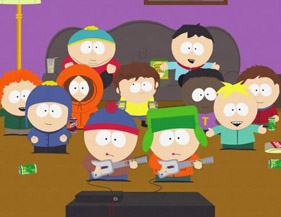|
|
Mythology: South ParkBy Martin FelipeApril 14, 2010
I wouldn’t call the honeymoon short-lived. I enjoyed many a good year of South Park after the movie. In time, however, a sense of dissatisfaction set in. As a liberal, I noted that, as the show continued to mature, what seemed to be a left-leaning ideology was trending more to the right. Well, that’s not entirely true. Confounding fans on both sides of the political aisle, Parker and Stone seemed to be targeting not one extreme or the other, but rather extremism itself. Episode after episode would begin with the reactionary adults jumping on some political bandwagon or another, while the more levelheaded Stan and Kyle roll their eyes at their parents’ foolishness. Now I don’t mean to suggest that the show should embrace my political leanings. I know that there is as much to mock about we lefties as there is about our conservative counterparts. I do mean to suggest, however, that by not taking a stand, the satirical bite of the show is growing flaccid as it hits the double century mark. Much like The Simpsons of a decade ago, South Park is reaching the point where it’s struggling to maintain its comic voice as new generations embrace other offerings - Family Guy being the most obvious example. The voice of South Park no longer meshes with its themes. Parker and Stone continue to find new ways to offend, to be extreme in their humor, but the message remains safe. “Just chill,” they tell us every week. “Don’t get so worked up. Just be disaffected observers like us, poking ribald fun at anyone who exhibits the slightest amount of passion.” The bland theme contradicts the broad style. As a result, South Park joins The Simpsons in being a revolutionary show with a now commonplace vision. The uniqueness and brilliance grows fuzzy and flavorless. Again, like The Simpsons, I think South Park is still among the cream of the crop, but I don’t like seeing the razor sharp edge grow blunt. Two hundred episodes is quite an accomplishment. Now that you’ve earned your place in television history, Trey and Matt, it’s time to take note of Eric Cartman’s catch phrase, “Screw you guys, I’m going home.”
|

|
|
|

|
Friday, November 1, 2024
© 2024 Box Office Prophets, a division of One Of Us, Inc.


